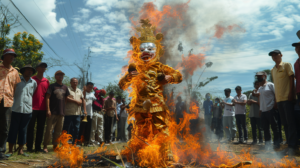Foreign Minister Kasit Advocates Strategic Diplomacy in Handling Thaksin’s Case
At the 15th Non-Aligned Movement (NAM) Summit in Egypt, Thailand’s Foreign Minister Kasit Piromya has called on Malaysia and Montenegro to consider the broader scope of their diplomatic relations with Thailand as they address reports of the presence of ousted Premier Thaksin Shinawatra within their borders. Kasit emphasized that while he is not issuing ultimatums, he hopes these nations will reflect on their ties with Thailand when deciding how to manage the fugitive leader’s potential entry under various passports.
“Thaksin is a fugitive of the law. However, the decision rests with these countries on how they choose to proceed,” Kasit stated from the seaside resort in Egypt, highlighting Thaksin’s efforts to destabilize Thailand from his self-imposed exile.
In addition to addressing the Thaksin issue, Kasit engaged in several bilateral meetings at the summit with counterparts from Finland, North Korea, Morocco, Sudan, India, Egypt, Indonesia, and Kosovo. Notably, Kasit, representing ASEAN, urged North Korea to participate in the ASEAN Regional Forum ministerial meeting to discuss its nuclear weapons program amidst global criticism.
Kasit highlighted ASEAN’s role as a mediator for North Korea with the international community, especially in the context of the U.S.’s more reconciliatory approach under President Barack Obama towards nations like Burma, Sudan, Syria, and Iran.
The Foreign Minister also discussed the deployment of 800 Thai troops to Darfur with Sudan’s Foreign Minister Deng Alor Kuol, viewing it as an opportunity to enhance bilateral relations and explore investment opportunities in Sudan, aiming to transform Thailand’s perception of Africa from a conflict zone to a land of opportunities.
With Finland, Kasit sought assistance in telecommunication system upgrades and state enterprise restructuring, citing Finland’s high rankings in transparency and ethics as models for Thailand in democratization and civic participation.
Morocco emerged as another key partner for Thailand, with discussions on strengthening ties and signing six Memoranda of Understanding. Kasit also expressed interest in Morocco’s handling of its separatist movement and plans to offer scholarships to Muslim students from Thailand.
The discussions extended to Serbia’s ongoing conflict and Kosovo’s independence, with Kasit exploring lessons for Thailand. Furthermore, talks with the European Union’s commissioner for external relations, Benita Ferrero-Waldner, hinted at a Comprehensive Plan of Action (CPA) with Thailand, potentially setting a precedent for ASEAN-EU agreements.
Thoughts
Oh, the delightful world of diplomacy, where veiled threats are dressed up as polite suggestions and moral paradoxes are the norm. Enter Kasit Piromya, Thailand’s Foreign Minister, playing the role of the concerned global citizen while juggling the hot potato that is Thaksin Shinawatra. Kasit’s not-so-subtle hints to countries like Malaysia about the implications of harboring Thailand’s favorite fugitive premier are less about giving ultimatums and more about reminding them just who they’re dealing with. It’s a bold move, assuming that Thailand wields enough influence to sway international decisions on asylum. Yet, the reality might just be that the rest of the world is too wrapped up in their own issues to lose sleep over Kasit’s thinly veiled threats or Thaksin’s latest globe-trotting escapades.
Then there’s Kasit’s sudden epiphany that Africa isn’t merely a backdrop for Hollywood’s next war movie but a land teeming with investment opportunities. Sudan, of all places, is crowned as Thailand’s gateway to the African market. As Thai troops don their peacekeeping hats in Darfur, back home, plans are afoot to cozy up to the very regime responsible for the region’s woes. It’s a masterclass in ethical gymnastics, showcasing Thailand’s eagerness to emulate Finland’s “strong ethics,” presumably by supporting regimes with questionable human rights records. The irony is so thick you could cut it with a knife.
But the cherry on top of this diplomatic sundae is Kasit’s musings on learning from Finland about democracy and civic participation. This coming from a man who played a starring role in a saga that saw a democratically elected government ousted, only to emerge as the Foreign Minister in the subsequent administration. One has to marvel at Kasit’s ability to discuss democracy with a straight face, given his history of undermining it. It’s as if he’s blissfully unaware of the contradiction, or perhaps he’s hoping we are.
In the end, Kasit’s diplomatic overtures seem less like genuine attempts at international cooperation and more like a comedy of errors, where the punchlines are lost in translation. Whether he’s issuing non-ultimatums, championing investment in controversial regimes, or extolling the virtues of democracy he once helped to derail, Kasit’s performance on the world stage is nothing if not entertaining. Just don’t expect a standing ovation from the audience.



